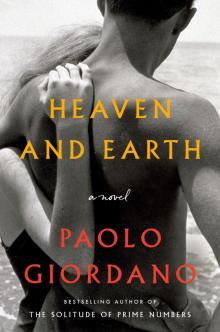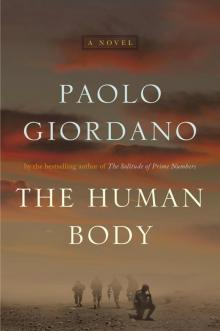- Home
- Paolo Giordano
The Solitude of Prime Numbers Page 2
The Solitude of Prime Numbers Read online
Page 2
The drop wasn’t very high. A few yards, just long enough to feel a slight void in your stomach and nothing beneath your feet. And then Alice was facedown in the snow, her skis pointing straight up in the air, and her fibula broken.
She didn’t really feel that bad. To tell the truth, she didn’t feel a thing. Only the snow that had slipped under her scarf and into her helmet and burned her skin.
The first thing she did was move her arms. When she was little and woke up to find it had snowed, her father would wrap her up tight and carry her downstairs. They would walk to the center of the courtyard and, hand in hand, would count to three and fall backward like a deadweight. Then her father would say make an angel, and Alice would move her arms up and down. When she got up and looked at her outline sculpted in the white, it really did look like the shadow of an angel with outspread wings.
Alice made a snow angel, just like that, for no reason, just to prove to herself that she was still alive. She managed to turn her head to one side and start breathing again, even though it felt as if the air wasn’t going where it was supposed to. She had the strange sensation of not knowing which way her legs were turned. The very strange sensation of no longer having legs at all.
She tried to get up, but she couldn’t.
If it weren’t for the fog, someone might have seen her from above, a green stain splayed at the bottom of a gully, a few steps from the spot where a little waterfall would start flowing again in the spring, where, with the first warmth, wild strawberries would grow, and if you waited long enough they’d ripen, as sweet as candy, and you could pick a basketful in a day. Alice cried for help, but her thin voice was swallowed up by the fog. She tried to get up again, or at least to turn over, but it was no use.
Her father had told her that people who freeze to death feel very hot and, just before dying, have an urge to get undressed. Almost everyone who dies of cold is found in their underwear. And hers were dirty.
She was starting to lose feeling in her fingers as well. She took off her glove, blew into it, and then put it back on her clenched fist, to warm it up. She did the same with her other hand. She repeated this ludicrous gesture two or three times.
It’s your extremities that get you, her father always said. Your toes and fingers, your nose and ears. Your heart does everything in its power to keep the blood to itself, leaving the rest to freeze.
Alice imagined her fingers turning blue and then, slowly, her arms and her legs. She thought about her heart pumping harder and harder, trying to keep in all the remaining warmth. She would go so stiff that if a wolf passed by it would snap off one of her arms just by stepping on it.
They must be looking for me.
I wonder if there really are any wolves around here.
I can’t feel my fingers anymore.
If only I hadn’t drunk that milk.
Bo-dy weight for-ward.
Of course not, wolves would be hibernating now.
Eric will be furious.
I don’t want to race.
Don’t be stupid, you know very well that wolves don’t hibernate.
Her thoughts were growing more and more circular and illogical.
The sun sank slowly behind Mount Chaberton as if nothing was the matter. The shadow of the mountains spread over Alice and the fog turned completely black.
THE ARCHIMEDES PRINCIPLE
1984
2
When the twins were small and Michela was up to one of her tricks, like throwing herself downstairs in her baby walker or sticking a pea up one of her nostrils, so that she had to be taken to the emergency room to have it removed with special tweezers, their father would always say to Mattia, the firstborn, that his mother’s womb was too small for both of them.
“God only knows what the two of you got up to in there,” he said. “I reckon all those kicks you gave your sister did her some serious damage.”
Then he laughed, even though it was no laughing matter. He lifted Michela in the air and buried his beard in her soft cheeks.
Mattia would watch from below. He would laugh too, letting his father’s words filter through him by osmosis, without really understanding them. He let them settle at the bottom of his stomach, forming a thick, sticky layer, like the sediment of wine that has aged for a long time.
His father’s laughter turned into a strained smile when, at two and a half, Michela still couldn’t utter a single word. Not even mommy or poo-poo or sleepy or woof. Her inarticulate little cries rose from such a solitary, deserted place that they made their father shiver every time.
When she was five and a half a speech therapist with thick glasses sat Michela down in front of a board with four different shapes cut out—a star, a circle, a square, and a triangle—and the corresponding colored pieces to place into the holes.
Michela looked at them with wonder.
“Where does the star go, Michela?” asked the speech therapist. Michela stared at the puzzle but didn’t touch anything. The doctor put the yellow star in her hand.
“Where does this go, Michela?” she asked.
Michela looked everywhere and nowhere. She put one of the points in her mouth and began to chew on it. The speech therapist took the object out of her mouth and asked the question yet again.
“Michela, do what the doctor tells you, for God’s sake,” snarled her father, who couldn’t quite manage to stay seated, as he’d been told.
“Signor Balossino, please,” the doctor said in a conciliatory voice. “Children need time.”
And Michela took her time. A whole minute. Then she let out a heartrending groan that might have been of joy or of despair, and resolutely jammed the star in the square hole.
In case Mattia had not already figured out for himself that something was not right with his sister, his classmates didn’t hesitate to point it out to him. Simona Volterra, for example, during the first year of school. When the teacher said Simona, you’re going to sit next to Michela this month, she refused, crossing her arms, and said I don’t want to sit next to her.
Mattia let Simona and the teacher argue for a while, and then said Miss, I can sit next to Michela again. Everyone had looked relieved: Michela, Simona, the teacher. Everyone except Mattia.
The twins sat in the front row. Michela spent the whole day coloring, meticulously going outside the lines and picking colors at random. Blue children, red skies, all the trees yellow. She gripped the pencil like a meat pounder, pressing down so hard that she often tore the page.
At her side Mattia learned to read and write, to add and subtract, and was the first in the class to master long division.
His brain seemed to be a perfect machine, in the same mysterious way that his sister’s was so defective.
Sometimes Michela would start squirming on her chair, waving her arms around crazily, like a trapped moth. Her eyes would grow dark and the teacher, more frightened than she was, would stand and look at her, vaguely hoping that the retard really might fly away one day. Someone in the back row would giggle, someone else would go shhh. So Mattia would get up, picking up his chair so that it wouldn’t scrape on the floor, and stand behind Michela, who by now was rolling her head from side to side and flailing her arms about so fast that he was afraid they would come off.
Mattia would take her hands and delicately wrap her arms around her chest.
“There, you don’t have wings anymore,” he’d whisper in her ear. It took Michela a few seconds before she stopped trembling. She’d stare into the distance for a few seconds, and then go back to tormenting her drawings as if nothing had happened. Mattia would sit back down, head lowered and ears red with embarrassment, and the teacher would go on with the lesson.
In the third year of primary school the twins still hadn’t been invited to any of their classmates’ birthday parties. Their mother noticed and thought she could solve the issue by throwing the twins a birthday party. At dinner, Mr. Balossino had rejected the suggestion out of hand. For heaven’s sake, Adele,
it’s already embarrassing enough as it is. Mattia sighed with relief and Michela dropped her fork for the tenth time. It was never mentioned again. Then, one morning in January, Riccardo Pelotti, a kid with red hair and baboon lips, came over to Mattia’s desk.
“Hey, my mom says you can come to my birthday party,” he blurted, looking at the blackboard.
“So can she,” he added, pointing to Michela, who was carefully smoothing the surface of the desk as if it were a bedsheet.
Mattia’s face went red with excitement. He said thank you, but Riccardo, having gotten the weight off his chest, had already left.
The twins’ mother immediately became anxious and took them both to Benetton for new clothes. They went to three toy shops, but Adele couldn’t make up her mind.
“What sort of things is Riccardo interested in? Would he like this?” she asked Mattia, holding up a jigsaw puzzle.
“How would I know?” her son replied.
“He’s a friend of yours. You must know what games he likes.”
Mattia didn’t think that Riccardo was a friend of his, but he couldn’t explain that to his mother. So he simply shrugged.
In the end Adele opted for the Lego spaceship, the biggest and most expensive toy in the store.
“Mom, it’s too much,” her son protested.
“Nonsense. And besides, there are two of you. You don’t want to make a bad impression.”
Mattia knew all too well that, Lego or no Lego, they would make a bad impression. With Michela, anything else was impossible. He knew that Riccardo had invited them only because he’d been told to. Michela would cling to him the whole time, spill orange juice on herself, and then start whining, as she always did when she was tired.
For the first time Mattia thought it might be better to stay at home.
Or rather, he thought it might be better if Michela stayed at home.
“Mom,” he began uncertainly.
Adele was looking in her bag for her wallet.
“Yes?”
Mattia took a breath.
“Does Michela really have to come to the party?”
Adele suddenly froze and stared into her son’s eyes. The cashier observed the scene indifferently, her hand open on the conveyor belt, waiting for the money. Michela was mixing up the candy on the rack.
Mattia’s cheeks burned, ready to receive a slap that never came.
“Of course she’s coming,” his mother said, and that was that.
Riccardo’s house was less than a ten-minute walk away, and they were allowed to go on their own. At three o’clock on the dot Adele pushed the twins out the door.
“Go on, or you’ll be late. Remember to thank his parents,” she said.
Then she turned to Mattia.
“Take care of your sister. You know she shouldn’t eat junk.”
Mattia nodded. Adele kissed them both on the cheek, Michela for longer. She tidied Michela’s hair under her hair band and said enjoy yourselves.
On the way to Riccardo’s house, Mattia’s thoughts kept time with the Lego pieces, which shifted back and forth inside the box like the tide. Michela, tagging a few feet behind him, stumbled as she tried to keep up, dragging her feet through the mush of dead leaves stuck to the pavement. The air was still and cold.
She’s going to drop her potato chips on the rug, thought Mattia.
She’ll grab the ball and she won’t want to give it back.
“Will you hurry up?” he said, turning to his twin sister, who had suddenly crouched down in the middle of the pavement and was torturing a long worm with her finger. Michela looked at her brother as if seeing him for the first time in ages. She smiled and ran to him, clutching the worm between her fingers. “You’re disgusting. Throw it away,” Mattia ordered, recoiling.
Michela looked at the worm again for a moment and seemed to be wondering how it had ended up in her hand. Then she dropped it and launched into a lopsided run to join her brother, who had already walked on ahead.
She’ll grab the ball and won’t want to give it back, just like at school, he thought to himself.
Mattia looked at his twin, who had his same eyes, same nose, same color hair, and a brain that belonged in the trash, and for the first time he felt genuine hatred. He took her hand to cross the street, because the cars were going fast, and it was then that the idea came to him.
He let go of Michela’s hand in its woolen glove, instantly thinking that it wasn’t right.
Then, as they were walking by the park, he changed his mind again and convinced himself that no one would ever find out.
Just for a few hours, he thought. Just this once. He abruptly changed direction, dragging Michela by an arm, and entered the park. The grass was still damp from the night’s frost. Michela trotted behind him, muddying her brand-new white suede boots. There was no one in the park; it was so cold that no one would have felt like going for a walk. The twins came to an area with trees, three wooden tables, and a barbecue. They had eaten lunch there once, in year one, when the teachers had taken them to collect dry leaves from which they made ugly table decorations to give to their grandparents for Christmas.
“Michela, listen to me,” said Mattia. “Are you listening?”
With Michela you always had to check that her narrow channel of communication was open. Mattia waited for his sister to nod.
“Good. So, I have to go away for a little while, okay? But I won’t be long, just half an hour,” he explained.
There was no reason to tell the truth, since to Michela there was little difference between half an hour and a whole day. The doctor had said that her spatiotemporal perception development had been arrested at a preconscious stage, and Mattia understood perfectly well what that meant.
“You sit here and wait for me,” he said to his twin. Michela stared gravely at her brother and didn’t reply, because she didn’t know what to say. She gave no sign of having really understood, but her eyes lit up for a moment, and for the rest of his life when Mattia thought of those eyes he thought of fear.
He took a few steps away from his sister, walking backward to make sure she didn’t follow him. Only prawns walk like that, his mother had yelled at him once, and they always end up crashing into something.
He was about fifteen yards away and Michela had already stopped looking at him, engrossed in trying to pull a button off her woolen coat.
Mattia turned around and started to run, tightly clutching the bag with the present. Inside the box more than two hundred little plastic blocks crashed into one another. It was as if they were trying to tell him something.
“Hi, Mattia,” Riccardo Pelotti’s mother said as she opened the door. “Where’s your little sister?”
“She has a temperature,” Mattia lied. “A mild one.”
“Oh, what a shame,” the woman said, not seeming displeased in the slightest. She stepped aside to let him in.
“Ricky, your friend Mattia is here. Come and say hello,” she called, turning toward the hall.
Riccardo appeared, sliding along the floor, an unpleasant expression on his face. He stopped for a second to glance at Mattia and look for traces of the retard. Relieved, he said hi.
Mattia waved the bag with the present under the woman’s nose.
“Where shall I put this?” he asked.
“What is it?” Riccardo asked suspiciously.
“Legos.”
Riccardo grabbed the bag and disappeared down the hall.
“Go with him,” Mrs. Pelotti said, pushing Mattia. “The party’s down there.”
The Pelottis’ living room was decorated with bunches of balloons.
On a table covered by a red paper tablecloth were bowls of popcorn and chips, a tray of dry pizza cut into squares, and a row of still unopened soda bottles of various colors. Some of Mattia’s classmates had already arrived and were standing in the middle of the room guarding the table.
Mattia took a few steps toward the others and then stopped a few yards away, like
a satellite that doesn’t want to take up too much room in the sky. No one paid him any attention.
When the room was full of children, an entertainer with a red plastic nose and a clown’s bowler hat made them play blindman’s buff and pin the tail on the donkey. Mattia won first prize, which consisted of an extra handful of candy, but only because he could see out from under the blindfold. Everyone shouted boo, you cheated, as he shamefacedly slipped the candy into his pocket.
Then, when it was dark outside, the clown turned out the lights, made them sit in a circle, and began to tell a horror story. He held a flashlight under his chin.
Mattia didn’t think the story was all that scary, but the face, lit up like that, sure was. The light shining from below turned it all red and revealed terrifying shadows. Mattia looked out the window to keep from looking at the clown and remembered Michela. He hadn’t ever really forgotten about her, but now for the first time he imagined her all alone among the trees, waiting for him, and rubbing her face with her white gloves to warm up a bit.
He got to his feet just as Riccardo’s mother came into the dark room carrying a cake covered with candles, and everyone started clapping, partly for the story and partly for the cake.
“I’ve got to go,” Mattia said to her, without even giving her time to set the cake down on the table.
“Right now? But the cake.”
“Yes, now. I’ve got to go.”
Riccardo’s mother looked at him from over the candles. Lit up like that, her face was full of threatening shadows, just like the clown’s. The other kids fell silent.
“Okay,” the woman said uncertainly. “Ricky, walk your friend to the door.”
“But I’ve got to blow out the candles.”
“Do as I say,” his mother ordered, still staring at Mattia.
“You’re such a drag, Mattia.”
Someone started laughing. Mattia followed Riccardo to the front door, pulled his jacket from the pile, and said thanks, bye. Riccardo didn’t even reply, quickly shutting the door behind him to run back to his cake.

 Like Family
Like Family Heaven and Earth
Heaven and Earth The Human Body
The Human Body The Solitude of Prime Numbers
The Solitude of Prime Numbers